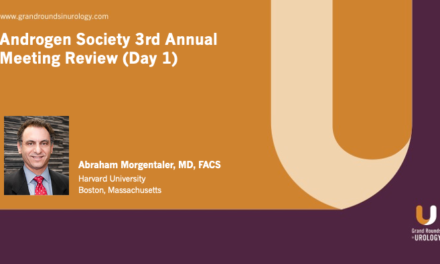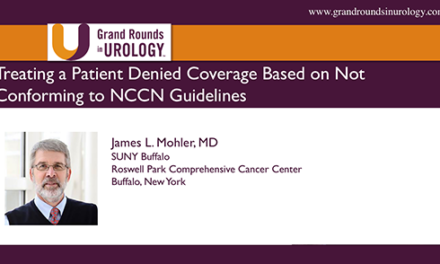Jelle Barentsz, MD, and E. David Crawford presented “What Does Suspicion for Prostate Cancer Mean, and What Metric Defines Prostate Cancer Risk?” for the Grand Rounds in Urology audience during a break at the 30th Annual International Prostate Cancer Update in January, 2020.
How to cite: Barentsz, Jelle. Crawford, E. David. “What Does Suspicion for Prostate Cancer Mean, and What Metric Defines Prostate Cancer Risk?” May, 2020. Accessed Jan 2025. https://dev.grandroundsinurology.com/what-does-suspicion-for-prostate-cancer-mean-and-what-metric-defines-prostate-cancer-risk/
What Does Suspicion for Prostate Cancer Mean, and What Metric Defines Prostate Cancer Risk? – Summary:
E. David Crawford, MD, Editor-in-Chief of Grand Rounds in Urology, interviews Jelle Barentsz, MD, PhD, Professor of Radiology at the University in Nijmegen in the Netherlands, about prostate cancer suspicions and which metrics define prostate cancer risk. Dr. Barentsz discusses the steps that must be taken if there is a suspicion of prostate cancer and emphasizes the importance that MRIs and molecular markers play in this. He notes that in an optimal world with a perfect MRI a molecular marker test is often unnecessary, but that sometimes we do not have perfect MRIs, and in these cases, molecular marker tests like SelectMDX are good tests to use. However, MRIs offer more information about potential cancer and are also better at excluding more significant cancers than molecular marker tests. Dr. Crawford and Dr. Barentsz come to the conclusion that which is better or necessary often depends on the country the patient resides in.
About The 30th Annual International Prostate Cancer Update:
The International Prostate Cancer Update (IPCU), founded in 1990, is a multi-day CME conference focused on prostate cancer treatment updates with expert, international faculty. It is led by expert physicians and is designed for urologists, medical oncologists, radiation oncologists, and other healthcare professionals involved in the diagnosis and treatment of prostate cancer. Dr. Barentsz & Dr. Crawford discussed this topic during a break at the 30th iteration of the meeting in January 2020.
Other parts of this interview include Are MRI Fusion Biopsies Necessary for Urologists?
For further educational activities from this conference, visit our collection page.
ABOUT THE AUTHOR
Jelle Barentsz, MD, PhD, is a Professor of Radiology at the Nijmegen Medical Center of Radboud University in Nijmegen, The Netherlands. He is an internationally recognized researcher known for developing, validating, and implementing new MRI techniques in oncology. He is also the Chair of the Prostate MR-Reference Center, Founding Member and Past-President of the International Cancer Imaging Society, and Past-President of the European Society of Urogenital Radiology (ESUR). In 1980, he earned his MD from Utrecht University. In 1990, he earned his PhD in medical research on MRI of the urinary bladder from Radboud University Nijmegen. Since then, he has contributed to almost 300 peer-reviewed publications. One of his notable contributions involves initiating PI-RADS and, along with ESUR and the American College of Radiology, making the system a world standard, thereby enabling early selective detection of aggressive prostate cancer. Also, he helped revive Combidex-MRI, which can detect 1.5 mm lymph node metastases of any cancer.
He has been decorated as a “Knight in the Order of the Dutch Lion.” In addition, he has been awarded the Wertheim Salomonson Medal, the SAR Lifetime Achievement Award, the Dutch Cancer Society’s Queen Wilhelmina Research Award, and the SCBTMR Lauterbur Award.





